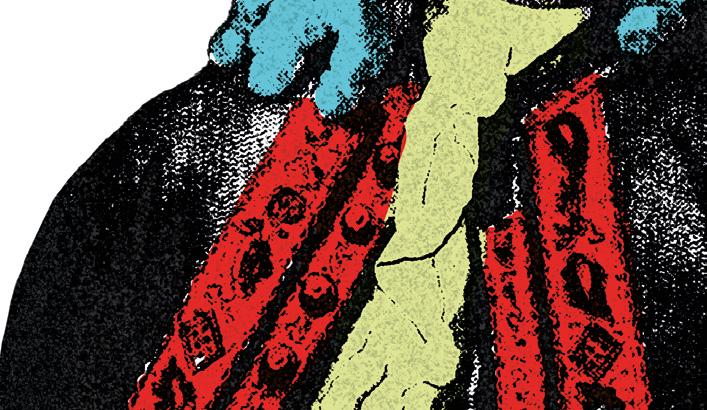
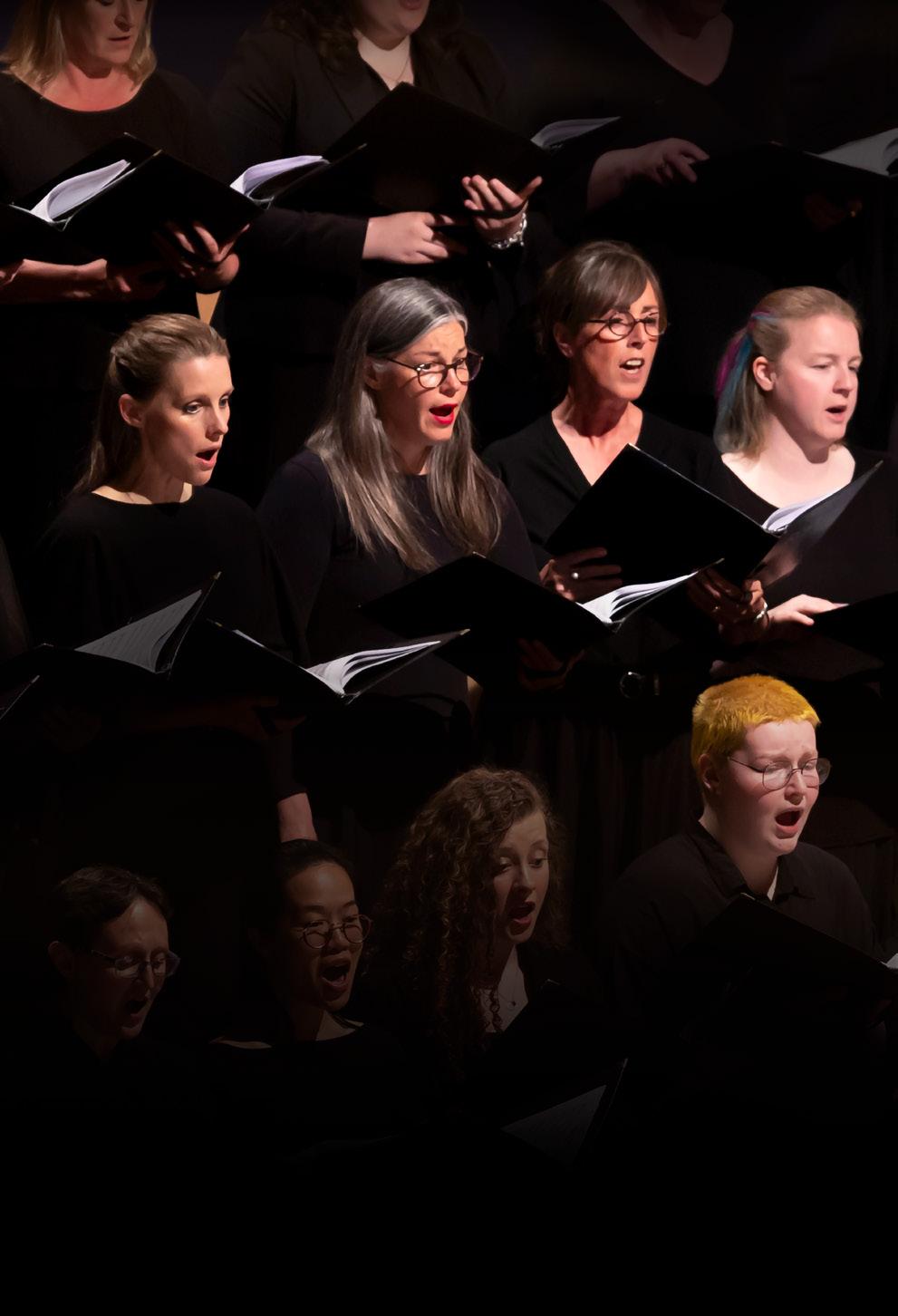



Usher Hall, Edinburgh Fri 28 Nov 2025 7.30pm
Glasgow Royal Concert Hall Sat 29 Nov 7.30pm
Sponsored by















Usher Hall, Edinburgh Fri 28 Nov 2025 7.30pm
Glasgow Royal Concert Hall Sat 29 Nov 7.30pm
Some say that Mozart wrote his C Minor Mass in fulfilment of a vow; others say that it’s even greater than his famous Requiem. But everyone who hears it agrees that it’s one of the mightiest and most moving of choral masterpieces. A superb team of solo singers join the RSNO and its Chorus, and the RSNO’s Principal Trumpet Christopher Hart takes the spotlight in the delightful concerto by Mozart’s closest musical friend – Joseph Haydn.
C SCHUMANN Three Mixed Choruses Op19 [10’]
HAYDN Trumpet Concerto in E flat Major [13’]
MOZART Great Mass in C Minor K427/417a [60’]
Thomas Søndergård Conductor
Christopher Hart Trumpet
Brenda Rae Soprano
Katie Coventry Mezzo-soprano
Edgardo Rocha Tenor
Andreas Landin Baritone
RSNO Chorus
Stephen Doughty Director, RSNO Chorus /Conductor, C Schumann
Royal Scottish National Orchestra

Sponsored by
The Glasgow performance will be recorded for the RSNO Archive. Supported by the Iain and Pamela Sinclair Legacy.
If viewing these notes at the concert, please do so considerately and not during performances. Please silence all mobile telephones and alerts, and refrain from taking photographs, without flash, until the end of each piece.
DUNDEE
THU 4 DEC: 7.30pm
EDINBURGH FRI 5 DEC: 7.30pm
GLASGOW SAT 6 DEC: 7.30pm

Tchaikovsky Violin Concerto
Mahler Symphony No1 Titan
Giedrė Šlekytė Conductor
Nemanja Radulović Violin
We have a packed stage for you tonight! Joining Music Director Thomas Søndergård in Mozart’s Great Mass in C Minor are Brenda Rae, Katie Coventry, Edgardo Rocha and Andreas Landin. We are very grateful to Brenda for stepping in for Mojca Erdmann, who has had to withdraw from these concerts.
But first we have the fantastic RSNO Chorus singing unaccompanied, conducted by Chorus Director Stephen Doughty. The Chorus has been busy recently with a tour to Hungary where they performed with the MÁV Symphony Orchestra and in Budapest’s Matthias Church, and now it’s full steam ahead preparing for our Christmas concerts.
The Chorus forms just one part of our vast singing programme, including our Youth Chorus and community choirs, which focuses on singing for health and wellbeing. The benefits of singing are well documented and I’m proud we’re able to offer so many opportunities for people to join in. You can find out more about our various choruses at rsno.org.uk/singers.
Tonight we also welcome section principal Christopher Hart to perform Haydn’s Trumpet Concerto. It’s such a pleasure to be able to shine a light on the talent within the Orchestra. Haydn’s is one of the most celebrated trumpet concertos in the repertoire and, in my opinion, the most beautiful piece of music anyone has ever written for trumpet. It’s a brilliant piece and I am absolutely certain that Chris will more than do it justice!
Alistair Mackie CHIEF EXECUTIVE
Keep in touch with the RSNO
Royal Scottish National Orchestra 19 Killermont Street
Glasgow G2 3NX T: +44 (0)141 226 3868
rsno.org.uk
Scottish Company No. 27809
Scottish Charity No. SC010702
The RSNO is supported by the Scottish Government

Formed in 1891 as the Scottish Orchestra, the company became the Scottish National Orchestra in 1950 and was awarded Royal Patronage in 1977. Many renowned conductors have contributed to its success, including Sir John Barbirolli, Walter Susskind, Sir Alexander Gibson, Neeme Järvi, Walter Weller, Alexander Lazarev and Stéphane Denève.
The Orchestra’s artistic team is led by Danish conductor Thomas Søndergård, who was appointed Music Director in 2018. In March 2024, Austrian-born conductor, composer and musician Patrick Hahn became the Orchestra’s Principal Guest Conductor.
The RSNO is supported by the Scottish Government and is one of the Scottish National Performing Companies. The Orchestra performs across Scotland, including concerts in Glasgow, Edinburgh, Dundee, Aberdeen, Perth and Inverness, and appears regularly at the Edinburgh International Festival and BBC Proms. The RSNO has made recent tours to China and Europe.
The RSNO has a worldwide reputation for the quality of its recordings, receiving a 2020 Gramophone Classical Music Award for Chopin’s
Piano Concertos (soloist: Benjamin Grosvenor), conducted by Elim Chan, two Diapason d’Or awards (Denève/Roussel 2007; Denève/Debussy 2012) and eight GRAMMY Award nominations. In recent years, the RSNO has cultivated an international reputation for world-class film, television and videogame soundtrack recording. The Orchestra has recorded for BAFTA-winning series Silo (Apple TV) and worked with the likes of GRAMMY Award-winning composer Lorne Balfe on Life on Our Planet (Netflix). Other notable titles include Nuremberg (Sony Pictures), Now You See Me: Now You Don’t (Lionsgate), Horizon: An American Saga (Warner Bros) and Star Wars Outlaws (Ubisoft). The Orchestra records at its bespoke in-house facility in Glasgow.
The RSNO believes that music can enrich lives, and aims to inspire, educate and entertain people throughout Scotland and beyond with its performances, recordings and engagement programmes. Supporting schools, families, young professionals and wider communities, the RSNO delivers high-quality initiatives for all ages and abilities.
FIRST VIOLIN
Maya Iwabuchi LEADER
Lena Zeliszewska ASSOCIATE LEADER
Tamás Fejes ASSISTANT LEADER
Patrick Curlett
Caroline Parry
Veronica Marziano
Alan Manson
Ursula Heidecker Allen
Elizabeth Bamping
Lorna Rough
Clarice Rarity
Susannah Lowdon
SECOND VIOLIN
Jacqueline Speirs
ASSOCIATE PRINCIPAL
Marion Wilson
Anne Bünemann
Robin Wilson
Emily Nenniger
Colin McKee
Paul Medd
Helena Rose
Sophie Lang
Kirsten Drew
VIOLA
Tom Dunn
PRINCIPAL
Felix Tanner
Asher Zaccardelli
Lisa Rourke
Claire Dunn
Beth Woodford
Susan Buchan
Maria Trittinger
CELLO
Pei-Jee Ng PRINCIPAL
Betsy Taylor
Yuuki Bouterey-Ishido
Sarah Digger
Rachael Lee
Robert Anderson
DOUBLE BASS
Nikita Naumov PRINCIPAL
Jamie Kenny
Michael Rae
Moray Jones
Alexandre Cruz dos Santos
FLUTE
Katherine Bryan PRINCIPAL
Siobhan Grealy
OBOE
Adrian Wilson PRINCIPAL
Henry Clay
PRINCIPAL COR ANGLAIS
BASSOON
David Hubbard
PRINCIPAL
Paolo Dutto
PRINCIPAL CONTRABASSOON
HORN
Amadea Dazeley-Gaist
PRINCIPAL
Martin Murphy
TRUMPET
Jason Lewis ASSOCIATE PRINCIPAL
Emily Ashby
TROMBONE
Dávur Juul Magnussen
PRINCIPAL
Cillian Ó Ceallacháin
Alastair Sinclair
PRINCIPAL BASS TROMBONE
TIMPANI
Benedikt Kurtz
GUEST PRINCIPAL
ORGAN
Tom Dilley



The RSNO Chorus performs in around six different programmes in up to 20 concerts across Scotland with the Royal Scottish National Orchestra each year. The RSNO Chorus has also had great success in recording with the Orchestra. Its recordings, among others, of Prokofiev’s Alexander Nevsky, conducted by Neeme Järvi, and Holst’s The Planets, conducted by David Lloyd-Jones, have both attracted high critical acclaim.
In addition to its commitment to the Orchestra, the RSNO Chorus performs independently and has been invited to perform with orchestras in many parts of the world, establishing an international status and touring to Copenhagen, Hong Kong, Israel, Germany, Belfast, Australia, Trondheim, Amsterdam, Prague and, most recently, Budapest. In 2018 it performed Britten’s War Requiem with the RSNO at the BBC Proms.
The RSNO Chorus evolved from a choir formed in 1843 to sing the first full performance of Handel’s Messiah in Scotland. Today it is one of the most successful choruses in the UK. In recent years it has performed practically every work in the standard choral repertoire along with contemporary works by renowned composers, including John Adams, Magnus Lindberg, Howard Shore and, most recently, the critically acclaimed Scottish Premiere of Sir James MacMillan’s Christmas Oratorio.
The RSNO Chorus is directed by Stephen Doughty, who was appointed to the role at the start of the 2022:23 Season.
SOPRANO 1
Alison Pryce-Jones
Becky Ward
Caroline Cradock
Catherine Taylor
Charlotte McKechnie
Iris O’Connell
Joan Lacy
Joanna Beaton
Joanna Webster
Karman Leung
Katherine Szumowski
Mhairi Hendry
Mary Fraser
Morag Kean
Morven MacDonald
Rei Camilleri
Rhona Christie
Roberta Yule
Sarah Greer
Seonaid Eadie
SOPRANO 2
Amelie Masters
Beth Kean
Carol McLean
Carole Sim Sayce
Eleanor Gaskell
Elspeth Waugh
Frances Kennedy
Heather Keating
Helen Hyland
Jenny Cheung
Jennifer Stoddart
Judith Pexton
Kate Adams
Katie Dew
Laura Gorman
Leila Inglis
Lorna Robertson
Lynsey Brook
Lynsey Scott
Mairi Therese Cleary
Margaret Mills
Miriam MacDonald
Sally Sandground
Theresa Hoare
ALTO 1
Ailie MacDougall
Angela McDonald
Anne Browning
Anne Murphy
Anne Thies
Brenda Williamson
Catriona Eadie
Esther McMillan
Fiona Taylor
Harriet Skipworth
Julia King
June Thomas
Kirstie Fairnie
Laura Macdonald
Lauren Hadley
Linda McLauchlan
Louise Reid
Marrian Murray
Mary Taylor
Maureen McCroskie
Marita McMillan
Olivia Howe Gillespie
Ruth Townsend
Siobhan Rodger
Sophy Ying
Uta Engelbrecht
ALTO 2
Alison Bryce
Ann Firth
Anne Newlands
Carol Leddy
Denny Henderson
Eleanor McLaren
Elizabeth Scobie
Elizabeth Stevenson
Gillian Downie
Hilde McKenna
Jane Stansfield
Janette Morrison
Martha Colvin
Moira Allingham
Sonja Crossan
TENOR 1
Alex Rankine
Andrew Clifford
David Miller
Nathan Dunsmore
TENOR 2
Alex Jamieson
Calum Lowe
Cosma Gottardi
David MacDonald
Donald Weetman
George Lloyd
Graham Parsonage
John Harvey
Kerr Noble
Laurie Nelson
Robert Paterson
Stuart Tait
BASS 1
Alistair Laird
Andrew Lyons
Andrew Matheson
Fraser Dalziel
George Lloyd
Ian MacKay
Ian Mills
Keith Thomasson
Mark Millington
Martin Engelbrecht
Martin Waddell
Michael Jamieson
Peter McMahon
Robin Watson
Stephen Penman
Stuart Corkindale
Toby Reed
BASS 2
Alan Maxwell
Chris Morris
Chris Spencer
Graeme Simpson
John MacLellan
Kenneth Allen
Melvyn Davies
Richard Goldie
Stephen Lipton
Stewart Macfarlane
Stewart McMillan
Tim Reilly
Tristan StewartRobertson
RSNO CHORUS DIRECTOR
Stephen Doughty
RSNO CHORUS
VOCAL COACH
Polly Beck
RSNO CHORUS REHEARSAL PIANIST
Edward Cohen
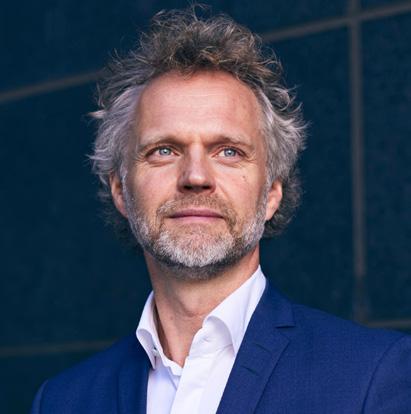
Danish conductor Thomas Søndergård has been Music Director of the RSNO since 2018, following six seasons as Principal Guest Conductor, and is Music Director of the Minnesota Orchestra. Between 2012 and 2018, he served as Principal Conductor of the BBC National Orchestra of Wales (BBC NOW), after stepping down as Principal Conductor and Musical Advisor of the Norwegian Radio Orchestra.
He has appeared with many notable orchestras in leading European centres, such as Berlin (Berliner Philharmoniker, RundfunkSinfonieorchester Berlin, Mahler Chamber Orchestra, Konzerthausorchester Berlin), Munich (Symphonieorchester des Bayerischen Rundfunk), Zurich (Tonhalle-Orchester Zürich), Leipzig (Gewandhausorchester), Paris (Orchestre National de France), London (London Philharmonic, BBC Symphony, London Symphony, Philharmonia Orchestra) and Amsterdam and Rotterdam (Royal Concertgebouw Orchestra, Netherlands Philharmonic, Rotterdam Philharmonic), and is a familiar figure in Scandinavia, with such orchestras as the Oslo Philharmonic, Gothenburg Symphony,
Danish National Symphony, Royal Stockholm Philharmonic, Swedish Radio Symphony, Finnish Radio Symphony and Helsinki Philharmonic. North American appearances to date have included the symphony orchestras of New York, Chicago, Cleveland, Cincinnati, Baltimore, St Louis, Toronto, Atlanta, Montreal, Vancouver, Houston and Seattle, and the LA Philharmonic.
Following his acclaimed debut for Royal Danish Opera (Poul Ruder’s Kafka’s Trial), he has since returned to conduct Die Walküre, Elektra, Le nozze di Figaro, Il barbiere di Siviglia, La bohème, The Cunning Little Vixen and Il viaggio a Reims. He has also enjoyed successful collaborations with Norwegian Opera and Royal Swedish Opera. His Stockholm productions of Tosca and Turandot (both with Nina Stemme) led to his Bayerische Staatsoper debut, conducting main season and Opera Festival performances of Turandot with Stemme. He made his Deutsche Oper Berlin debut with the world premiere of Scartazzini’s Edward II and has since returned for Berlioz’s Romeo and Juliet and Strauss’ Elektra.
His discography covers a broad range of contemporary and mainstream repertoire, including Nielsen, Sibelius symphonies and tone poems (with the BBC NOW), Lutosławski and Dutilleux cello concertos (with Johannes Moser and the Rundfunk-Sinfonieorchester Berlin) and violinist Vilde Frang’s celebrated debut recording (with the WDR Köln). With the RSNO on Linn Records Thomas has recorded works by Richard Strauss, Prokofiev, Bacewicz, Lutosławski and Szymanowski.
In 2023, Thomas was a recipient of the Carl Nielsen and Anne-Marie Carl Nielsen’s Foundation award for his outstanding contribution to Danish musical life. In 2022, he was decorated with a prestigious Royal Order of Chivalry, the Order of Dannebrog (Ridder af Dannebrogordenen), by Her Majesty Margrethe II, Queen of Denmark.

Stephen Doughty has been Chorus Director of the RSNO Chorus since the start of the 2022:23 Season. Since his arrival the Chorus has seen an influx of new members, and an abundance of varied and critically acclaimed performances, including Verdi’s Requiem, Britten’s War Requiem, Bruckner’s E Minor Mass and the Scottish premiere of Sir James MacMillan’s Christmas Oratorio. He has also directed the Chorus in new and imaginative programmes in their own right, including Rheinberger’s Mass in E flat for double choir, and concerts with percussion and organ featuring Bernstein’s Chichester Psalms, the European premiere of McIntyre’s Missa Brevis and Ives’ final major choral work, Psalm 90
Stephen’s previous 12-year tenure as Chorus Master of Belfast Philharmonic Choir included a number of world premieres, most significantly James Whitbourn’s The Seven Heavens and Philip Hammond’s Requiem for the Lost Souls of the Titanic, performed exactly 100 years since the liner went down, and further European premieres of both Stuart Scott’s Requiem Brevis, which saw the 100-strong choir separated into eight choirs spaced around the audience, and Christopher Marshall’s Earthsong
Stephen particularly enjoys working with amateur singers, not least leading regular singing days frequently involving up to 800 amateur singers. He was Musical Director of Edinburgh Bach Choir for seven years and has enjoyed directing the Garleton Singers for over 30 years, performing with them recently at the Lammermuir Festival.
Stephen plays harpsichord/organ continuo and orchestral piano and has given frequent organ recitals, including several on the grand Mulholland Organ in the Ulster Hall, Belfast. He is also in demand as an arranger and orchestrator, with a large portfolio of work particularly for young voices. He has produced a plethora of arrangements of the music of pianist Christopher Norton, including two publications of piano duets and a suite for wind sextet, and has received commissions from Children’s Classic Concerts, the Ulster Orchestra and the RSNO. Commissions from the BBC have seen his work being performed on BBC Alba and at the Last Night of the Proms, and his pieces feature on several recordings, including with the RSNO Chorus.
Stephen is an Examiner for the Associated Board of the Royal Schools of Music.

FIRST PERFORMANCE
Dresden, 8 June 1848
DURATION 10 minutes
Abendfeier in Venedig
Vorwärts
Gondoliera
In 1844 Clara Schumann and her husband Robert moved to Dresden, where they would spend the next six years. They had moved ostensibly for Robert’s health, after he had suffered a nervous breakdown. Robert entered a period of prolific creativity; Clara, too, in between giving birth to four of their eight children, supporting Robert’s career and maintaining her own as a celebrated concert pianist and teacher, managed to compose – if, unsurprisingly, far less than before her marriage.
Trauma lingered. In 1847 the Schumanns’ son Emil died aged just 16 months. Robert, newly interested in choral singing, decided to set up a chorus of mixed voices – soprano, alto, tenor, bass – the Chorgesangverein (Choral
Singing Society). Growing quickly to 60–70 members, it was an immediate success. Robert conducted and composed for the chorus. Clara accompanied at the piano – much to the awe of the singers – and also performed as soloist in their concerts. ‘We often get together outside of town … and walk back beneath the starry sky singing Mendelssohn songs,’ wrote Robert. ‘Everyone is so cheerful that you can’t help feeling the same way.’
Clara’s compositions, after marriage, were largely piano works and songs, often as gifts for Robert. The Drei gemischte Chöre (Three Mixed Choruses), her only choral pieces, were written in 1848 for her husband’s birthday on 8 June.
Spring 1848 was full of upheaval, both personal and societal. Revolution was spreading across Europe – coming to Dresden the following year –and agitating society. Clara had given birth to her fifth child, Ludwig, in January.
The three songs – Abendfeier in Venedig, Vorwärts and Gondoliera – which make up the Drei gemischte Chöre are set to poems by Emanuel von Geibel, a contemporary whose poetry was popular among composers, both for its subject matter and the musicality of his verse. The first is a shimmering meditation, with harmonic distortions and repetitions, on hearing the evening bells of St Mark’s Basilica in Venice. The second is a brief uplifting march, driven and skilfully varied. The final setting returns to Venice and dreamy nighttime meetings of lovers, the vocal parts breaking into brief duets above the swaying gondolas of the four vocal parts. These character pieces show Clara’s supreme skill in song-setting and her inventive response to words in music.
Clara rehearsed the Drei gemischte Chöre in secret with a few members of the Chorgesangverein, and they surprised her
husband with a performance on the morning of his birthday. Robert was immediately taken with the set, rehearsing and performing it with the full chorus the following month on a boat trip down
Abendfeier in Venedig
Ave Maria! Meer und Himmel ruh’n, Von allen Türmen hallt der Glocken Ton.
Ave Maria! Laßt vom ird’schen Tun, Zur Jungfrau betet, zu der Jungfrau Sohn!
Des Himmels Scharen selber knieen nun Mit Lilienstäben vor des Vaters Thron, Und durch die Rosenwolken wehn die Lieder
Der sel’gen Geister feierlich hernieder.
O heil’ge Andacht, welche jedes Herz
Mit leisen Schauern wunderbar durchdringt!
O sel’ger Glaube, der sich himmelwärts
Auf des Gebetes weißem Fittig schwingt!
In milde Tränen löst sich da der Schmerz, Indes der Freude Jubel sanfter klingt.
Ave Maria! Wenn die Glocke tönet, So lächeln Erd’ und Himmel mild versöhnet.
Vorwärts
Lass das Träumen, lass das Zagen, Unermüdet wandre fort!
Will die Kraft dir schier versagen, ‘Vorwärts’ ist das rechte Wort.
Darfst nicht weilen, wenn die Stunde Rosen dir entgegenbringt, Wenn dir aus des Meeres Grunde
Die Sirene lockend singt.
Vorwärts, vorwärts! Im Gesange
Ringe mit dem Schmerz der Welt, Bis auf deine heisse Wange Goldner Strahl von oben fällt,
the Elbe, and in an evening concert for Clara on her birthday in September. They remained unpublished until 1989.
© Sarah Urwin Jones
Ave Maria! Sea and heaven are resting, From every tower echoes the sound of bells, Ave Maria! Leave off your earthly endeavours, Pray to the Virgin, to the Virgin’s son,
The hosts of Heaven themselves are now kneeling
With staves of lilies before the Father’s throne, And through the rosy clouds the songs Of the blessed spirits waft solemnly down [towards earth].
Oh holy devotion, which marvellously penetrates Every heart with a quiet shiver!
Oh holy faith that soars towards heaven
On the white wings of prayer!
There pain dissolves into mild tears, While the rejoicing of happiness rings out more gently.
Ave Maria! When the bell sounds, Earth and heaven smile, reconciled.
Leave off dreaming, leave off hesitating. Wander on tirelessly!
When your strength is nearly failing, ‘Onward’ is the right word.
You must not tarry when the hour Brings you roses; When from the depths of the sea
The siren tempts you.
Onward, onward! In song Wrestle with the pain of the world, Until upon your burning cheek Falls a golden beam from above.
Bis der Kranz, der dichtbelaubte, Schattig deine Stirn umwebt, Bis verklärend überm Haupte
Dir des Geistes Flamme schwebt.
Vorwärts drum durch Feindes Zinnen, Vorwärts durch des Todes Pein, Wer den Himmel will gewinnen, Muss ein rechter Kämpfer sein!
Gondoliera
O komm zu mir, wenn durch die Nacht
Wandelt das Sternenheer,
Dann schwebt mit uns in Mondespracht
Die Gondel übers Meer.
Die Luft ist weich wie Liebesscherz, Sanft spielt der goldne Schein, Die Zither klingt und zieht dein Herz
Mit in die Lust hinein.
O komm zu mir, wenn durch die Nacht
Wandelt das Sternenheer,
Dann schwebt mit uns in Mondespracht
Die Gondel übers Meer.
Dies ist für sel’ge Lieb’ die Stund, Liebchen, o komm und schau,
So friedlich strahlt des Himmels Rund, Es schläft des Meeres Blau.
Und wie es schläft, so sagt der Blick, Was nie die Zunge spricht, Das Auge zieht sich nicht zurück, zurück die Seele nicht
O komm zu mir, wenn durch die Nacht
Wandelt das Sternenheer,
Dann schwebt mit uns in Mondespracht
Die Gondel übers Meer.
Until the wreath, thick with leaves, Weaves about and shadows your brow.
Until your head is transfigured By the flame of the spirit hovering above it.
Onward then through the foe’s battlements, Onward through the pain of death, Those who wish to win [entrance to] Heaven
Must be true warriors!
Gondola Song
Oh come to me, when the legion of stars wanders through the night!
Then, in the glory of moonlight, the gondola will gently float with us over the sea!
The air is as soft as love’s teasing, the golden glow is playing gently.
The zither sounds and draws your heart along with it into joy.
Oh come to me, when the legion of stars wanders through the night!
Then, in the glory of moonlight, the gondola will gently float with us over the sea!
This is the hour of blissful love!
My darling, oh come and see!
The heavenly vault is glowing so peacefully, the blueness of the sea is sleeping!
And as it sleeps, [our] glances speak what [our] lips never dare to say.
[Our] eyes do not retreat, our souls do not shrink back.
Oh come to me, when the legion of stars wanders through the night!
Then, in the glory of moonlight, the gondola will gently float with us over the sea!
Translations © by Sharon Krebs, reprinted with permission from the LiederNet Archive

FIRST PERFORMANCE
Vienna, 28 March 1800
DURATION 13 minutes
1. Allegro
2. Andante cantabile
3. Allegro
The closing years of Haydn’s long and highly productive composing career reached their climax in the two great choral works The Creation and The Seasons. Having spent much of his working life in Eisenstadt, in the service of the Esterházy family, Haydn now lived for most of the year in Vienna, moving to Eisenstadt only for a short period each summer. It was while writing The Creation that Haydn composed both his last work for the stage, the incidental music for The Patriot King, or Alfred and Elvida by the English playwright Alexander Bicknell, and his last major orchestral work, the Trumpet Concerto in E flat Major.
The inspiration for the Trumpet Concerto was a newly modified instrument, the keyed trumpet, created by Anton Weidinger, a friend of Haydn and trumpeter of the Imperial Court Orchestra in Vienna. Before 1800, a trumpet was simply a coiled tube of brass about eight feet long (about twice as long as the standard modern instrument), starting with a mouthpiece at one end and flaring into a bell at the other, with none of the valve machinery in the middle that characterises the modern instrument. It was capable of playing the ‘natural’ notes of the overtone series, which has large intervals at the low end and progressively smaller ones as pitch gets higher, so that the trumpeter could play scales, instead of just bugle-call notes, only by cultivating the trumpet’s very highest notes. (In the early 18th century, composers such as Bach wrote fabulous, florid trumpet parts in the extreme high register of the instrument, but by Haydn’s day this art of ‘clarino’ playing was largely confined to royal courts and monasteries.)
The orchestral trumpeter of the Classical period principally cultivated only about ten notes – the notes of a major chord at the bottom and half of a major scale at the top. The parts they played were simple, if not dull, consisting of fanfare
figures and notes thrown in for added emphasis and volume. It is remarkable, in retrospect, how little dissatisfaction there was with this state of affairs. It was generally accepted that the trumpet had only ten notes, just as it was accepted that the timpani had only two, and no one expected either instrument to be melodic. Weidinger’s modifications to the natural trumpet (in which keys, operated by the player’s left hand, were added, covering holes which could each raise the pitch a semitone) allowed the instrument to be played chromatically throughout its entire register.
Haydn responded to the capability of the instrument like a gleeful child with a new toy. At the outset of the Concerto he indulges in a little teasing, letting the trumpet join the orchestra in the opening tutti for a few notes, all of them playable on the natural trumpet. Only with the first solo entrance does he break new ground, with the trumpet running up the scale from its written middle C, playing notes not possible on the natural trumpet. From then on the trumpet sings, slides around chromatically, skips and jumps, and every now and then plays a fanfare figure, as if Haydn wants to remind us that this newfangled thing really is a trumpet. A short fanfare serves as a coda, but Haydn left no cadenza – doubtless that was Weidinger’s privilege.
The slow movement is in A flat Major, a pastoral movement as amiable as the stag in The Creation, and very much reflects the
lyrical abilities of the trumpet. The music pulls towards the remote key of C flat Major, surely for Weidinger’s benefit and for those members of the audience who realised that they were hearing the impossible – notes that could not previously have been played on a trumpet. The Concerto ends with a brilliant rondo, witness both to Haydn’s unfailing powers of invention and to the technical prowess of Weidinger.
Although the Concerto was written in 1796, it was not performed until 1800, and one might well infer that Weidinger needed the four years to work out how to negotiate the more difficult passages.
For a number of reasons, the keyed trumpet never became an orchestral instrument. Trumpets with valves instead of keys were invented a few years after Haydn’s death in 1809, but did not start to make headway into orchestras for nearly a generation. They did not become standard in orchestras until about 1840. In that interval the whole idea of a trumpet concerto, so common in the Baroque era, was much neglected. Haydn’s Trumpet Concerto lay forgotten until the 20th century, when it was heard again in a broadcast made in 1928 by the virtuoso trumpeter George Eskdale and the New Queen’s Hall Orchestra.
© Mark Fielding

RSNO Principal Trumpet Christopher Hart studied at the Royal Welsh College of Music and Drama and at the Royal Academy of Music in London before joining the RSNO in 2016.
He has since performed all over the world as Guest Principal Trumpet with the London Symphony Orchestra, Philharmonia Orchestra, London Philharmonic Orchestra, Orchestra of the Royal Opera House and BBC Symphony Orchestra under such esteemed conductors as Sir Simon Rattle, Sir Antonio Pappano, Sir Mark Elder, Vladimir Ashkenazy, Vladimir Jurowski, Sakari Oramo and Gianandrea Noseda.
Christopher Hart is supported by the Ms Chris Grace Hartness Chair
K427/417a
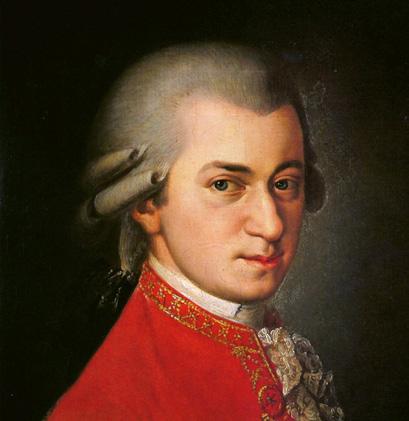
FIRST PERFORMANCE
Salzburg, 26 October 1783
DURATION 60 minutes
1. Kyrie
2. Gloria
Gloria in excelsis
Laudamus te Gratias agimus tibi
Domine Deus
Qui tollis
Quoniam tu solus
Jesu Christe
Cum Sancto Spiritu
3. Credo
Credo in unum Deum
Et incarnatus est
4. Sanctus
Sanctus Dominus
Hosanna in excelsis
5. Benedictus
Benedictus qui venit
Mozart married Constanze Weber at St Stephen’s Cathedral in Vienna on 4 August 1782. Back in Salzburg, his father Leopold, who did not approve of the match, sent a belated blessing.
On 3 January 1783 Mozart mentioned in a letter to his father a vow he had taken to compose a Mass setting in gratitude for his marriage, which he was halfway through.
That August, following a delay partly caused by the birth of the Mozarts’ first child, the young married couple travelled to Salzburg to visit Leopold and Mozart’s sister Nannerl. They took with them the Mass, which even though still not complete was performed at St Peter ’s Abbey in Salzburg on 26 October, with Constanze as one of the soprano soloists – indeed, the most prominent and virtuosic, presumably (as much as anything else) to show off her vocal skills to her husband’s family.
In fact, for whatever reason, Mozart did not go on to complete the Mass in C Minor, though it remains a very substantial torso. As such, it has attracted musicologists to, as it were, fill in the blanks.
The first edition was prepared in 1840 by the composer and publisher Johann Anton André, who had purchased a substantial quantity of Mozart’s scores (including the autograph manuscript of the Mass) from Constanze in 1799.
When the first edition of Mozart’s entire works was published between 1883 and 1910, a completion of the Mass was undertaken by Alois Schmitt and Ernst Lewicki; this became the standard performing edition until relatively recently.
Starting with a new edition by the distinguished scholar H C Robbins Landon in 1956, various subsequent attempts have been made to
correct earlier errors and to incorporate the small amounts of newly discovered material emanating from Mozart himself (sketches, formerly missing orchestral parts and so on).
The edition (1988) by the mathematician and musicologist Richard Maunder (1937-2018) performed tonight has been one of the most successful, as in the case of his similar work on another incomplete Mozart masterpiece, the Requiem K626.
Mozart himself made further use of some of the material from the Kyrie and Gloria of the Mass in his biblical cantata Davide Penitente (The Penitent David) K469, first performed in the Burgtheater in Vienna in 1785.
Those movements in the sources either entirely or in part missing are the remaining sections of the Credo following the first two, whose orchestration is in itself incomplete, and all of the Agnus Dei. Reconstruction of some missing elements in the Sanctus and Benedictus is also necessary.
Maunder ’s approach (as with those of several of his colleagues) was to flesh out missing choral parts or orchestration within the movements that
Kyrie
Kyrie eleison, Christe eleison, Kyrie eleison.
Gloria
Gloria in excelsis Deo. Et in terra pax hominibus bonae voluntatis.
Laudamus te. Benedicimus te.
Adoramus te. Glorificamus te.
Gratias agimus tibi propter magnam gloriam tuam.
Domine Deus, Rex coelestis, Deus Pater omnipotens.
Mozart himself wrote. Other musicologists have sought speculatively to create entire missing movements by borrowing material from the composer ’s other Mass settings, or from sketches for other pieces, necessarily involving a certain amount of new composition in Mozartian style.
Notable features of the Maunder edition include additional parts for trombones, trumpets and timpani in the Gloria; additional parts for horns and viola in the Et incarnatus est, to which he adds the tempo marking Andante ma sostenuto; additional choral parts in the Sanctus; and again a viola part and additional choral parts in the Hosanna in excelsis. Maunder argues cogently for all of these in the introduction to his full score.
The Mass is scored on a substantial scale, with four soloists, double SATB choir, flute (only used in the Et incarnatus est), two each of oboes, bassoons, horns and trumpets, three trombones, timpani, organ continuo and strings. Even in incomplete form, the piece is the longest and most magnificent of Mozart’s Mass settings, showing in many places the impact of works by Baroque masters such as Handel and Bach that Mozart had been studying.
© George Hall
Kyrie
Lord, have mercy. Christ, have mercy. Lord, have mercy.
Gloria
Glory to God in the highest. And on Earth peace to people of good will. We praise You. We bless You. We worship You. We glorify You. We give You thanks for Your great glory. Lord God, heavenly king, God the Father almighty,
Domine Fili unigenite, Jesu Christe.
Domine Deus, Agnus Dei, Filius Patris.
Qui tollis peccata mundi, miserere nobis.
Qui tollis peccata mundi, suscipe deprecationem nostram. Qui sedes ad dexteram Patris, miserere nobis.
Quoniam tu solus sanctus. Tu solus Dominus.
Tu solus Altissimus, Jesu Christe.
Cum Sancto Spiritu in gloria Dei Patris. Amen.
Credo
Credo in unum Deum, Patrem omnipotentem, factorem coeli et terrae, visibilium omnium, et invisibilium. Et in unum Dominum Jesum Christum, Filium Dei unigenitum.
Et ex Patre natum ante omni saecula.
Deum de Deo, lumen de lumine, Deum verum de Deo vero. Genitum, non factum, consubstantialem patri: per quem omnia facta sunt.
Qui propter nos homines, et propter nostram salutem descendit de caelis.
Et incarnatus est de Spiritu Sancto ex Maria Virgine: Et homo factus est.
Sanctus
Sanctus, Sanctus, Sanctus, Dominus Deus Sabaoth. Pleni sunt coeli et terra gloria tua. Hosanna in excelsis.
Benedictus
Benedictus qui venit in nomine Domini. Hosanna in excelsis.
Lord Jesus Christ, the only begotten Son. Lord God, Lamb of God, Son of the Father. You, Who take away the sins of the world, have mercy on us.
You, Who take away the sins of the world, receive our prayer.
You, Who sit at the right hand of the Father, have mercy upon us.
For You alone are holy. You alone are the Lord. You alone, O Jesus Christ, are most high. With the Holy Spirit, in the glory of God the Father. Amen.
Credo
I believe in one God, The Father almighty, maker of heaven and earth, and of all things visible and invisible. And I believe in one Lord, Jesus Christ, the only begotten Son of God. Born of the Father before all ages. God of God, Light of Light, true God of true God. Begotten, not made, of one being with the Father: By whom all things were made. Who for us and for our salvation came down from heaven. And He became flesh by the Holy Spirit of the Virgin Mary: And was made man.
Sanctus
Holy, Holy, Holy Lord God of hosts.
Heaven and earth are filled with Your glory. Hosanna in the highest.
Benedictus
Blessed is He who comes in the name of the Lord. Hosanna in the highest.

FRI 2 JAN: 3pm GLASGOW ROYAL CONCERT HALL
Laurence Cummings Conductor
Anna Devin Soprano
Claudia Huckle Alto
Nick Pritchard Tenor
George Humphreys Baritone
RSNO Chorus
Stephen Doughty Director, RSNO Chorus
Paul Whittaker BSL Performer BSL
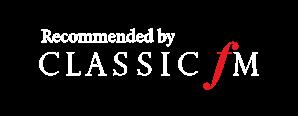

American soprano Brenda Rae’s recent European highlights include a long-awaited return to Oper Frankfurt as Lulu – a role she debuted in William Kentridge’s production at English National Opera – in Nadja Loschky’s new production, under Thomas Guggeis, as well as Aminta in Jan Philipp Gloger’s new production of Die schweigsame Frau for Staatsoper Unter den Linden under Christian Thielemann. She returned to the role of Gilda Rigoletto both for Deutsche Oper Berlin under Michele Spotti and Opernhaus Zürich, and returned to the title role in Claus Guth’s new production of Semele conducted by Gianluca Capuano at the Bayerische Staatsoper. At Opéra Bastille she most recently performed the title role Lucia di Lammermoor under Aziz Shokhakimov and Ophelia Hamlet conducted by Thomas Hengelbrock, and at the Wiener Staatsoper she continued her reign as the Queen of the Night Die Zauberflöte and latterly as Amina La Sonnambula under Giacomo Sagripanti. Brenda debuted at the Glyndebourne Festival as Armida Rinaldo, which was part of the BBC Proms and released on DVD by Opus Arte. More
recent seasons have brought debuts for the Royal Ballet & Opera and Salzburg Festival as the Queen of the Night, as well as her return to the Teatro Real Madrid in the title role in Christopher Alden’s new production of Partenope under Ivor Bolton.
Brenda made her US operatic stage debut at the 2013 Santa Fe Opera Festival as Violetta La traviata and has since returned as Norina Don Pasquale, both Mme Vladimirescu and Mme Herz The Impresario, Cunegonde Candide and Lucia Lucia di Lammermoor. Her continued collaboration with Harry Bicket brought her house debut at the Lyric Opera of Chicago as Ginevra Ariodante, and performances as Semele Semele on tour with The English Concert to London, Paris and New York. At the Metropolitan Opera, Brenda has returned as both Zerbinetta Ariadne auf Naxos, conducted by Marek Janowski, and Ophelia (Brett Dean’s Hamlet) under Nicholas Carter.
An experienced recitalist, Brenda is a regular guest at the celebrated Schubertiade in Schwarzenberg and at Wigmore Hall in London.
This season at the Teatro Real and Palau de la Música Catalana, Brenda sings the role of Petra in the world premiere of Francisco Coll’s setting of Ibsen’s An Enemy of the People. At the Grand Theâtre de Genève she embraces the surreal world of Frank Zappa’s 200 Motels, making its Swiss premiere.
Unfortunately Mojca Erdmann, the advertised soprano for these concerts, is unwell. The RSNO is extremely grateful to Barbara Rae for stepping in at short notice.

Scottish mezzo-soprano Katie Coventry returned to the Salzburg Landestheater for the 2024/25 season, where her roles included Hänsel Hänsel und Gretel and Marchesa Melibea Il viaggio a Reims. She had started the 2023/24 season there with her role debut as Rosina in The Barber of Seville. Other roles included Orlofsky Die Fledermaus, Cecilio Lucio Silla and Daisy in Stuart MacRae’s Anthropocene
In 2022/23 Katie made her debut at the Royal Danish Opera covering the role of Offred in Paul Ruder’s The Handmaid’s Tale. Katie also made her debut with the Royal Liverpool Philharmonic Orchestra singing the solo line in Scott of the Antarctic under Andrew Manze, as well as her debut with English Touring Opera as Orsini Lucrezia Borgia and covering Sesto Giulio Cesare.
In 2021/22 Katie made her debut at Nederlandse Reisopera as Sesto in a production which transferred to the Handelfestspiele Göttingen. Later that season, she made her delayed debut with the Hallé Orchestra as Kate Pinkerton Madama Butterfly before returning to the Glyndebourne Festival to cover Ruggiero Alcina, stepping in for three performances and marking her Glyndebourne stage debut. She also appeared with the RSNO in Vaughan Williams’ Sinfonia Antartica
As a previous Harewood Artist, Katie has a close relationship with English National Opera. She made her ENO debut as Edith The Pirates of Penzance and in 2017 made her role debut there as Cherubino The Marriage of Figaro
On the concert platform, Katie has performed in the Mozart Requiem at the Royal Albert Hall and Cadogan Hall, Duruflé Requiem at Southwark Cathedral, Haydn Nelson Mass at Riga Dom and numerous oratorios at St James’ Piccadilly and St Martin-in-the-Fields.
A participant in the Salzburg Festival’s Young Singer Project in 2018, Katie is a graduate of the Royal College of Music International Opera School, where she studied with Tim Evans-Jones as an Independent Opera Voice Scholar. She was a finalist in the inaugural Grange Festival International Singing Competition, the winner of the 2017 Joaninha Award and is an Independent Opera Voice Fellow.

Edgardo Rocha is one of today’s foremost interpreters of the bel canto repertoire, praised for his warm timbre, lively coloratura and brilliant high notes. Since making his European debut in the title role of Gianni di Parigi by Donizetti at the Festival della Valle d’Itria di Martina Franca, he has been a frequent guest at the world’s leading opera houses and festivals, including the Opernhaus Zürich, Grand Théâtre de Genève, Bayerische Staatsoper, Vienna State Opera and Salzburg Festival.
In the 2025/26 season, he makes his role debut as Nemorino, first at Stadttheater Gießen and later at the Vienna State Opera, in Otto Schenk’s celebrated production of L’elisir d’amore. The performances this weekend mark Rocha’s RSNO debut.
Recent highlights include his debut as Florestano in Paër’s rarely performed Leonora at the Chicago Opera Theater, as well as the title role in La clemenza di Tito, first at Salzburg’s Mozartwoche in a staging by Rolando Villazón and later with the Washington Concert Opera under Antony Walker.
Two roles have become cornerstones of Rocha’s repertoire: Don Ramiro in La Cenerentola and Almaviva in Il barbiere di Siviglia. Rocha has sung Don Ramiro notably at the Grand Théâtre de Genève, Vienna State Opera, Seattle Opera, Opéra de MonteCarlo and Elbphilharmonie Hamburg. A career highlight was a world tour of La Cenerentola with mezzo-soprano Cecilia Bartoli celebrating the 200th anniversary of Rossini’s masterpiece. As Almaviva, Rocha has appeared at the Vienna State Opera, Los Angeles Opera, Opéra National de Paris, Teatro Real Madrid, Palau de les Arts Reina Sofía, Bayerische Staatsoper, Semperoper Dresden, Opernhaus Zürich, Teatro San Carlo di Napoli, Salzburg Festival and on tour through Switzerland with Opéra de Monte-Carlo.
A frequent guest at the Vienna State Opera, Rocha has performed Don Ottavio Don Giovanni, Ferrando Così fan tutte, Ernesto Don Pasquale and Lindoro L’Italiana in Algeri as well as Almaviva and Don Ramiro. At the Grand Théâtre de Genève, Rocha has been a central figure in Donizetti’s Tudor Trilogy, debuting the title role in Roberto Devereux and reprising Percy Anna Bolena and Robert Dudley Maria Stuarda
Rocha’s versatility has also led him into French repertoire, with roles including Nadir Les pêcheurs de perles at Opéra de Nancy, Gérald Lakmé at Opernhaus Zürich, Lyonel in Halévy’s L’éclair at the Grand Théâtre de Genève and Léopold in Halévy’s La Juive at the Bayerische Staatsoper.
Born in Rivera, Uruguay and educated in piano, choral and orchestra conducting at the Montevideo University School of Music, Rocha studied singing with Alba Tonelli, Beatriz Pazos and Raquel Pierotti. After moving to Italy in 2008, he continued his studies with the tenor Salvatore Fisichella and the Rossini tenor Rockwell Blake.

Andreas Landin was born in Sweden and educated in Stockholm and at the Opera Academy at the Royal Opera in Copenhagen. In his early career he specialised in contemporary music and has sung more than 30 contemporary opera roles, many of them composed directly for him. He has also performed numerous oratorios and art songs by contemporary composers. Church music has always been a large part of his repertoire, and he has sung most of the Classical and Baroque oratorios.
In recent years he has begun to perform the mainstream opera repertoire, and has sung roles including Scarpia in Puccini’s Tosca, Harlequin in Richard Strauss’ Ariadne auf Naxos and the title role in Verdi’s Macbeth. Future projects include the title role in Mozart’s Don Giovanni and Don Pizarro in Beethoven’s Fidelio.
He made his RSNO debut earlier this month in Vaughan Williams’ Songs of Travel












A highlight of the festive season: ERCU’s 138th new year performance of Handel’s celebrated oratorio
Friday 2 January 2026 at 12 noon
David Bates Conductor
Edinburgh Pro Musica Orchestra
Gloria! with Brussels Choral Society
Dynamic, dramatic and uplifting music
Poulenc Gloria
Bruckner Mass in D minor
Sunday 15 March 2026 at 3 pm
Michael Bawtree Conductor
The Orchestra of Scottish Opera







Your support can brighten a child’s day. Will you help us bring the joy of music to children across Scotland?
Scan the QR code to be taken to our donate page or visit rsno.org.uk/every-child

We are grateful to all our individual supporters for their generous philanthropy and loyalty. Your support enables the Orchestra to achieve its most ambitious goals and to continue inspiring people across Scotland both on and off the concert stage.
RSNO Benefactors
Sir Ewan and Lady Brown
Gavin and Kate Gemmell
Kat Heathcote and Iain Macneil
Ms Chris Grace Hartness
RSNO Patrons
Geoff and Mary Ball
Lady Rebecca Fraser
George Ritchie
Stephen Sweeney
Valerie Wells
Chair Patrons
Assistant Conductor
The Solti Foundation Chair
First Violin
Maya Iwabuchi LEADER
Dunard Fund Chair
Tamás Fejes ASSISTANT LEADER
The Bill and Rosalind Gregson Chair
Ursula Heidecker Allen
The James and Iris Miller Chair
Elizabeth Bamping
The WL and Vera Heywood Chair
Alan Manson
The Hugh and Linda Bruce-Watt Chair
Liam Lynch
Mr Kyle Anderson Weir
Lorna Rough
The Sir Richard Dunbar Chair
RSNO Conductors’ Circle
Ardgowan Charitable Trust
Stina Bruce Jones
Ian and Evelyn Crombie
Kenneth and Julia Greig
Shirley Murray
David and Alix Stevenson
Rolf and Celia Thornqvist
Eric and Karen Young
Learning and Engagement Patrons
William Brown, W.S
The Dundee RSNO Circle Committee
Neil and Nicola Gordon
Professor Gillian Mead, FRSE
Nicholas and Alison Muntz
Maurice and Nicola Taylor Charitable Trust
Second Violin
Marion Wilson ASSOCIATE PRINCIPAL
The Nigel & Margot Russell Chair
Sophie Lang
The Ian & Evelyn Crombie Chair
Emily Nenniger
Mr Jamie & Kyle Anderson Weir
Viola
Tom Dunn PRINCIPAL
The Cathy & Keith MacGillivray Chair
Lisa Rourke SUB PRINCIPAL
The Meta Ramsay Chair
Francesca Hunt
The Rolf and Celia Thornqvist Chair
Beth Woodford
Mr Jamie & Kyle Anderson Weir
Cello
Pei-Jee Ng PRINCIPAL
Mr Jamie & Kyle Anderson Weir
Betsy Taylor ASSOCIATE PRINCIPAL
The Maxwell Armstrong Chair
Kennedy Leitch ASSISTANT PRINCIPAL
The David and Anne Smith Chair
Rachael Lee
The Christine and Arthur Hamilton Chair
Double Bass
Nikita Naumov PRINCIPAL
The Gregor Forbes John Clark Chair
Michael Rae ASSISTANT PRINCIPAL
James Wood Bequest Fund Chair
Flute
Katherine Bryan PRINCIPAL
The David and Anne Smith Chair
Oboe
Adrian Wilson PRINCIPAL
The Hedley Wright Chair
Peter Dykes ASSOCIATE PRINCIPAL
Witherby Publishing Group Charitable Trust Chair
Cor Anglais
Henry Clay PRINCIPAL
In memory of a dear friend, Fiona H
Clarinet
Timothy Orpen PRINCIPAL
The Shirley Murray Chair
William Knight
The Turcan Connell Chair
Horn
David McClenaghan SUB-PRINCIPAL
The Springbank Distillers Chair
Alison Murray ASSISTANT PRINCIPAL
Mr & Mrs Pierre and Alison Girard
Martin Murphy ASSISTANT PRINCIPAL
The Gordon Fraser Charitable Trust Chair
Andrew McLean
The Catherine McLagan Chair
Trumpet
Christopher Hart PRINCIPAL
Ms Chris Grace Hartness
Timpani
Paul Philbert PRINCIPAL
Ms Chris Grace Hartness
Staff
Chiko Parkinson
COMMUNITY SINGING ASSISTANT
Supported by ScotRail
We are also grateful to those who give but who wish to remain anonymous.
If you would like to discuss how you can become an RSNO Patron, please contact Constance Fraser, Head of Development (Individuals and Partnerships), at constance.fraser@rsno.org.uk
Virtuoso
Ms Catherine Y Alexander
Mrs A M Bennett
Mr Alan and Mrs Carolyn Bonnyman
Dame Susan and Mr John Bruce
Stephen and Morny Carter
Francesca and Eoghan Contini Mackie
Dr Clive Criper
Scott and Frieda Grier
Judith and David Halkerston
Iain MacNeil and Kat Heathcote
Martin and Carola Gordon
Miss A McGrory
Miss M Michie
Mr James Miller CBE
Mrs Abigail Morrison
Nicholas and Alison Muntz
Meta Ramsay
Mr and Mrs W Semple
Gregor and Lesley Stewart
Mr Ian Taft
Claire and Mark Urquhart
Raymond and Brenda Williamson
Margaret Duffy and Peter Williamson
Symphony
Mr John Brownlie
Mr A Campbell
Dr K Chapman and Ms S Adam
Sir Sandy and Lady Crombie
Mr W G Geddes
Elizabeth Gibb
Dr Robert Gibb
Mr I Gow
Mr J D Home
Christine Lessels
Katharine M E Liston
Mrs A McQueen
Mr Iain Percival
Mr and Mrs David Robinson
Ian and Janet Szymanski
Dr C Cradock and Dr S Todd
Nelson and Barbara Waters
Philip Whitely and Robert H Mackay
Concerto
Neil Barton
Miss D Blackie
Dr C M Bronte-Stewart
Dr F L Brown
Mr and Mrs Burnside
David Caldwell
Ms H Calvert
Ross Cavanagh
Myk Cichla
Terry and Joan Cole
Dr J Coleiro
Mr and Mrs B H Cross
Christine and Jo Danbolt
Mr P Davidson
Steven J Davis
Mr and Mrs K B Dietz
Mr C Ffoulkes
William Findlay
Mr and Mrs M Gilbert
Simon and Fiona Guest
Lord and Lady Hamilton
Mrs S Hawthorn
P Hayes
Dr and Mrs P Heywood
Ms H Kay
Mr and Mrs W Kean
Nicholas Kilpatrick
Christine Lessels
Morag MacCormick
Mr and Mrs Marwick
Mr S Marwick
Mrs Sandra Maxwell
Mr and Mrs G McAllister
Mrs M McDonald
Dr A H McKee
Mr Rod McLoughlin
Morag Millar
Mrs B Morinaud
Dr and Mrs D Mowle
Mr K R and Dr C C Parish
Ms A and Miss I Reeve
Mrs E M Robertson
Dr and Mrs G K Simpson
Mrs Henrietta Simpson
Dr Norma Smith
Mr and Mrs A Stewart
David and Helen Strachan
Mr I Strachan
Mr G Stronach
Dr G R Sutherland
Mr and Mrs J B Watson
Mr and Mrs D Weetman
Helen and Peter Wilde
David W Wren
Roderick Wylie
Sonata
Mr and Mrs G H Ainsley
Mr K Allen
Dr A D Beattie
Jenny Beattie
Mrs H Benzie
Mr R Billingham
Lord and Lady Borthwick
John Bradshaw and Shiona Mackie
Mrs Bryan
Andrew Burrows
Mrs C M Campbell
Miss S M Carlyon
Amanda Carter-Fraser
Alan Clevett
Lady Coulsfield
Adam and Lesley Cumming
Mrs C Donald
J Donald and L Knifton
Mr John Duffy
Mr R M Duncan
Brigadier and Mrs C C Dunphie
Mrs E Egan
Mr R Ellis
Mr R B Erskine
Dr E Evans
Dr A Ewing
David Ferrier
Kenneth Forbes
Mr D Fraser
Ms J Gardner
Philip and Karen Gaskell
Mrs M Gibson
Mrs M Gillan
Mrs J K Gowans
Dr J and Mrs H Graham
Professor and Mrs A R Grieve
Dr P J Harper
Dr N Harrison
Mr and Mrs R J Hart
Bobby and Rhona Hogg
Mr and Mrs F Howell
Mrs A Hunter
Inez Hutchison
Professor R N Ibbett
Thomas Jakobsen Burns
Geoffrey and Elizabeth Johnston
Ms K Lang
Dr D A Lunt
Mrs Jean C Martin
Mr and Mrs J Martin
Ms S McArthur
Jean McCutcheon
Mr M McGarvie
Mrs S McGeachan
Hon Lord McGhie
Dr Colin McHardy
Ms H L McLaren
Margaret McLay
Libby McLean
Mr and Mrs B Mellon
Kathryn Michael
Mr I Mills
Mrs P Molyneaux
Kenneth M Murray
Bruce and Christine Nelson
Alastair Ogilvie
Mr and Mrs K O’Hare
Mr and Mrs K Osborne
Dr G Osbourne
Mr A Ownsworth
Mr R Parry
John Paterson
Misses J and M Penman
Mr J W Pottinger
Miss J A Raiker
Mr M Rattray
Alastair Reid
Ms F Reith
Dr and Mrs D Robb
Anne Robertson
Mr I Robertson
Ms A Robson
Sheriff Linda Ruxton
Mrs J Shanks
Mr J A Shipley
Dr M J and Mrs J A Shirreffs
Richard and Gillian Shirreffs
Ana Smith
Mrs E Smith
Mr M Smith
Dr and Mrs B Stack
Mrs Lorna Statham
Mrs R F Stewart
Mr and Mrs B Tait
Lisbeth Thoms
Dr and Mrs T Thomson
Mr C Turnbull
Dr Morag Ward
Dr Alex Watson
Mr W Watters
Alan Weddell
Mr and Mrs D Weetman
Mr R Young
Thank you to all our members of the Circle, including Overture members and those who wish to remain anonymous.
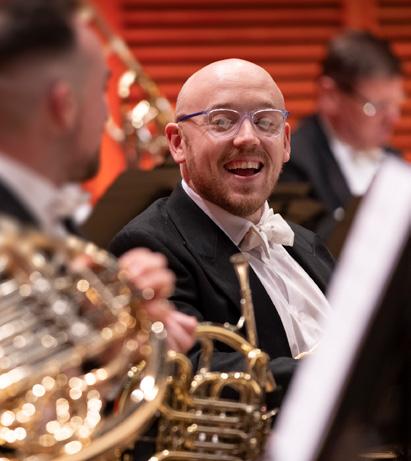
If you would like to discuss how you can become an RSNO Circle member, please contact Polly Lightbody, Individual Giving and Partnerships Officer, at polly.lightbody@rsno.org.uk

Charitable trusts and foundations have a distinguished history of supporting the RSNO, both on and off the stage. From one-off donations for specific concerts and musicians’ chairs, to multi-year funding for our community engagement initiatives, including our Schools Programme, every grant in support of our work is truly appreciated. We are grateful to the following trusts and foundations for their generosity:
Aberdeen Endowments Trust
ABO Sirens Fund
Adam Mickiewicz Institute
Alexander Moncur Charitable Trust
Alma & Leslie Wolfson Charitable Trust
Adam Mickiewicz Institute
Balgay Children’s Society
Boris Karloff Charitable Foundation
Brownlie Charitable Trust
Castansa Trust
CMS Charitable Trust
Common Humanity Arts Trust
Cookie Matheson Charitable Trust
Cruden Foundation
David and June Gordon Memorial Trust
Dunclay Charitable Trust
Educational Institute of Scotland
Ettrick Charitable Trust
Fidelio Charitable Trust
Forteviot Charitable Trust
Gannochy Trust
Gaelic Language Promotion Trust
Gordon Fraser Charitable Trust
Harbinson Charitable Trust
Hobart Charitable Trust
Hugh Fraser Foundation
James Wood Bequest Fund
Jennie S Gordon Memorial Foundation
Jean & Roger Miller’s Charitable Trust
Jimmie Cairncross Charitable Trust
John Scott Trust Fund
John Mather Trust
Jones Family Charitable Trust
JTH Charitable Trust
Leach Family Charitable Trust
Leng Charitable Trust
Lethendy Charitable Trust
Marchus Trust
McGlashan Charitable Trust
Meikle Foundation
Mickel Fund
Miss E C Hendry Charitable Trust
Miss Jean R Stirrat’s Charitable Trust
Murdoch Forrest Charitable Trust
N Smith Charitable Settlement
Nancie Massey Charitable Trust
Noel Coward Foundation
Northwood Charitable Trust
Nugee Foundation
Pear Tree Fund for Music
PF Charitable Trust
Pump House Trust
Q Charitable Trust
R J Larg Family Trust
Ronald Miller Foundation
Rowena Alison Goffin Charitable Trust
Russell Trust
Scops Arts Trust
Scott Davidson Charitable Trust
Scottish Enterprise
Solti Foundation
Souter Charitable Trust
Stanley Morrison Charitable Trust
Stevenston Charitable Trust
Sylvia Aitken Charitable Trust
Tay Charitable Trust
Thriplow Charitable Trust
Tillyloss Trust
W A Cargill Fund
W M Mann Foundation
W M Sword Charitable Trust
Walter Scott Giving Group
Wavendon Foundation
Weir Charitable Trust
Zich Trust
We are also grateful to a number of trusts that wish to stay anonymous.
If you would like more information about our work and how you can make a difference, please contact Niamh Kelly, Trusts and Projects Manager, at niamh.kelly@rsno.org.uk
FUNDERS





PRINCIPAL MEDIA PARTNER



CORPORATE SUPPORTERS



PRINCIPAL TRANSPORT PARTNER


BROADCAST PARTNER

PARTNERS
Adelaide Place • Age Scotland • Black Lives in Music • Charanga • Children’s Classic Concerts
Children’s Hospices Across Scotland • Classic FM • Douglas Academy • Dundee Science Centre
Dunedin Consort • Edinburgh Zoo • Education Scotland • Fanzclub • Gig Buddies • GMAC Film
Heads of Instrumental Teaching Scotland • Hebrides Ensemble Kibble • Luminate • Marine Conservation Society
MARSM • Music Education Partnership Group • ParentZone • The Pyramid at Anderston
Royal Conservatoire of Scotland • Scottish Book Trust • Scottish Chamber Orchestra
Scottish Refugee Council • Sistema Scotland • St Mary’s Music School • Tayside Healthcare Arts Trust
Trees for Life • University of Glasgow • V&A Dundee • Visible Fictions
With thanks to Mr Hedley G Wright and the Springbank Distillery for their support of the RSNO
If you would like more information about sponsorships, corporate partnerships or fundraising events with the RSNO, please contact Constance Fraser, Head of Development (Individuals and Partnerships), at constance.fraser@rsno.org.uk
PATRON
His Majesty The King
ARTISTIC TEAM
Thomas Søndergård
MUSIC DIRECTOR
Patrick Hahn
PRINCIPAL GUEST CONDUCTOR
Celia Llácer
ASSISTANT CONDUCTOR
Ellie Slorach
ENGAGEMENT CONDUCTOR
Kellen Gray
ASSOCIATE ARTIST
Neeme Järvi
CONDUCTOR LAUREATE
Alexander Lazarev
CONDUCTOR EMERITUS
Stephen Doughty DIRECTOR, RSNO CHORUS
Patrick Barrett DIRECTOR, RSNO YOUTH CHORUSES
CHIEF EXECUTIVE
Alistair Mackie
CHIEF EXECUTIVE
Dr Jane Donald
DEPUTY CHIEF EXECUTIVE
Charlotte Jennings
EXECUTIVE ASSISTANT (MATERNITY LEAVE COVER)
Nicola Kelman
EXECUTIVE ASSISTANT (MATERNITY LEAVE)
PLANNING
Tammo Schuelke
DIRECTOR OF ARTISTIC PLANNING
Xander van Vliet
ARTISTIC PLANNING MANAGER
Rachel Pullin
ARTISTIC PLANNING OFFICER
Richard Payne
HEAD OF LIBRARY SERVICES
Megan Bousfield
LIBRARY ASSISTANT
Christine Walker
CHORUS MANAGER
ORCHESTRA MANAGEMENT
Matthias Van Der Swaagh
HEAD OF ORCHESTRA MANAGEMENT
Brodie Smith
DEPUTY ORCHESTRA MANAGER
OPERATIONS AND PRODUCTION
Craig Swindells
HEAD OF PRODUCTION
Ashley Holland
STAGE MANAGER
Dylan Findlay
ASSISTANT STAGE MANAGER
Ted Howie
FACILITIES MANAGER
RSNO BOARD OF DIRECTORS
Elected Directors
Gregor Stewart
CHAIR
Gail Blain
HONORARY TREASURER
Ruth Binks
Kayla-Megan Burns
Ken Hay
Kat Heathcote MBE
Don Macleod
David Robinson
John Stewart
David Strachan
Cllr Edward Thornley
NOMINATED DIRECTOR
Julia Miller
COMPANY SECRETARY
LEARNING AND ENGAGEMENT
Andrew Stevenson
DIRECTOR OF ENGAGEMENT
Anna Crawford
ENGAGEMENT DELIVERY MANAGER (MATERNITY LEAVE)
Rachel Naismith
ENGAGEMENT DELIVERY MANAGER (MATERNITY COVER)
Maisie Leddy
ENGAGEMENT PRODUCER
Chiko Parkinson
COMMUNITY CHORUS AND PARTNERSHIPS COORDINATOR SUPPORTED BY SCOTRAIL
EXTERNAL RELATIONS
Dr Jane Donald
DIRECTOR OF EXTERNAL RELATIONS
Carol Fleming
HEAD OF MARKETING
Constance Fraser
HEAD OF DEVELOPMENT (INDIVIDUALS AND PARTNERSHIPS)
Kirsten Reid
HEAD OF DEVELOPMENT (TRUSTS AND PROJECTS) (MATERNITY LEAVE)
Lisa Ballantyne
PARTNERSHIPS OFFICER
Keilidh Bradley
GRADUATE ANIMATOR
Ian Brooke
PROGRAMMES EDITOR
Fred Bruce
TRUSTS AND PROJECTS ADMINISTRATOR
Clara Cowen
MARKETING MANAGER
Seonaid Eadie
EXTERNAL RELATIONS OFFICER
Katie Kean
COMMUNICATIONS AND MARKETING OFFICER
Niamh Kelly
TRUSTS AND PROJECTS MANAGER
Player Directors
Katherine Bryan
Christopher Hart
David Hubbard
William Knight
David McClenaghan
Lorna Rough
SCHOOLS ADVISORY GROUP
Ruth Binks
Pam Black
Norman Bolton
Martin Greig
Mae Murrary
Polly Lightbody
INDIVIDUAL GIVING AND PARTNERSHIPS OFFICER
Graham Ramage
GRAPHIC DESIGNER
Sam Stone
INFORMATION SERVICES MANAGER
Ross Williamson
VIDEO PRODUCER (MARKETING)
Hedd Morfett-Jones
STUDIO MANAGER
Sam McErlean
MEDIA MANAGER AND AUDIO ENGINEER
Ahan Sengupta
TRAINEE AUDIO ENGINEER
FINANCE AND CORPORATE SERVICES
Susan Rennie
HEAD OF FINANCE
Jade Wilson
FINANCE OFFICER
Abby Dennison
FINANCE ADMINISTRATOR
Phoebe Connolly
FINANCE ASSISTANT




